Text
I never noticed that Chihiro had spelled her name wrong on the contract. That’s a really interesting detail, and may explain why she was able to retain her name. I definitely agree that the movie was criticizing consumerism and money, since no matter how much gold the No Face gave Chihiro it couldn’t save her parents. The employees are also desperate for the No Face’s gold like you mention in your post since they barely get any money from their job at the hot springs under Yubaba’s supervision. I think that it was a good criticism of capitalism and work culture.
Hayao Miyazaki: Spirited Away
Initial Reaction
I had high hopes for Spirited Away, since a friend told me that this is one of her all-time favorite films. I must admit, I was not disappointed. There’s so much to analyze from capitalism, consumerism culture, environmental concerns, and human rights issues. One viewing for this film is not enough to uncover Miyazaki’s whole message. Although it is an anime, I feel that this is one that adults may enjoy and appreciate more than children for its social commentary. Nevertheless, it is a film that transcends age and national boundaries making it a film that anyone can relate to. Out of all the films we’ve watched this semester, this is one I plan on re-watching.
Social Commentary
The Importance of Your Name
The first scene, we, as an audience, encounter the importance a name holds is when Yubaba takes Chihiro’s name from her and renames her Sen. In the scene, we see Yubaba sucking up Chihiro’s name from the contract and leaving her with only a part of her full name. Interestingly, if you look closely enough, Chihiro misspelled part of her last name.
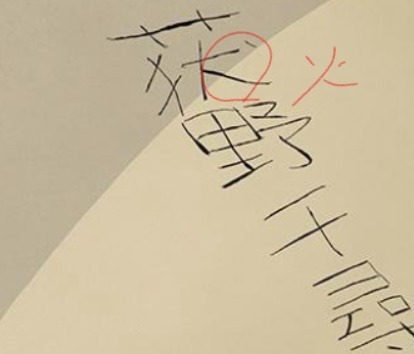
Though it is highly unlikely that she knew of the importance of retaining her name – Haku only warns her afterwards that Yubaba enslaves people by taking their name away from them – this emphasizes the idea that a name represents someone’s identity. In taking away names from her workers, Yubaba takes away people’s freedom of thought and free-will and disables them from questioning her authority much like the societal structure we live in today. This especially rings true in Japan’s society in which hierarchical structures are, in many cases, based off age. While this practice has its pros in that the population at large respect their elders, it also reaps problems in which situations that should be based on merit may be overridden solely by who in the group is the oldest. Chihiro represents the antagonist to such structures and is able to save her parents and Haku, because she stays true to herself and her values.
Money ≠ Happiness
Miyazaki quite obviously critiques the way in which capitalist society causes people to put money on a pedestal throughout the film’s screen time. This is prominently depicted in the scene where No Face shells out gold coins and the bathhouse workers immediately pick it up in a crazed manner. The workers only curry his (?) favor because they love his money and the status it brings him – not No Face, himself. Each mistakenly seem to believe that money will solve all their problems. After all, their lifestyle stems from only being able to work in a place that offers minimum wage at best and in which the working conditions are poor. However, Yubaba demonstrates that money may buy the tools to be happy, but does not necessarily correlate to a person’s level of happiness. Since, though, she may be financially well-off, she does not have enough time to spend time with her baby Boh who is the ultimate source of her happiness. In this sense, she also falls victim to the pitfalls created by capitalist societies.
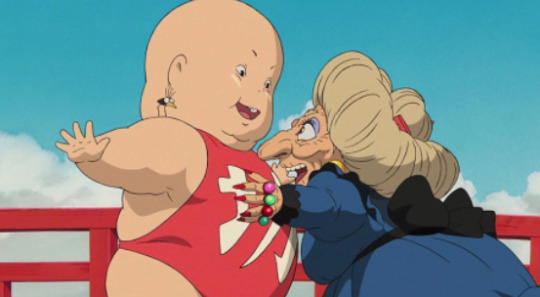
Also, can I just say that the ending song is exquisite!? It’s been one of my favorites for a long time, even though I had never watched Spirited Away the whole way through.
Here’s a link to a beautiful rendition by the original singer, Youmi Kimura: https://www.youtube.com/watch?v=kdO2X0QlYYI.
I also like this version by Ukrainian singer, Nataliya Gudziy: https://www.youtube.com/watch?v=xQJog0rs7Eg. The slower tempo fits the piece well and her personal connection to the lyrics represent the universality of Spirited Away’s themes.
10 notes
·
View notes
Text
Spirited Away - Miyazaki
For this blog post I will be discussing Spirited Away by Miyazaki. I, unlike most people, had not seen a Miyazaki film until I watched Spirited Away in this class. I always thought “I’ll get around to it eventually”, and it would always be on the end of an infinite anime backlog.
It was about what I expected in terms of story and animation. The story was simple, but was engaging enough for the purposes of the movie. Considering that this movie was made for children I guess you probably should not expect anything too complex in terms of story or themes. I feel like the highlight of the movie was by far the animation. Everything seemed to be just teeming with life and it really captured your attention. I, being an enjoyer of anime myself, like Tarantino in Sukiyaki Western Django, am familiar with the animation shortcuts and tropes. It never felt like they were skimping out on animation or using a still frame while just moving a mouth for a frame or two. The animation also never felt choppy, so there were not any moments I noticed where it felt like a slide show (like when you are playing an online game with a poor connection and the frames drop). Everything very fluid and you could really feel movement in the world of Spirited Away. The character that best exemplifies this would be Haku when he is in his dragon form and is flying through the sky.
In terms of the movies themes, the first one I thought of was identity. Chihiro’s name was stolen by Yubaba when she signs the contract for the job. While it prevents her from turning into an animal, it makes her lose her name (which is what traps people in this spirit world). Haku the river spirit remembers Chihiro’s name which is what allows her to be able to try and escape the spirit world. Similarly Chihiro is able to remember Haku’s name, in turn freeing him. Essentially the movie tries to show why it’s important to remember who you are.
The movie also briefly commentate on pollution and the environment with the stink spirit. The stink spirit wasn’t actually a stink spirit at all, but was a great river spirit. Chihiro cleans it in the bath and pulls out a bunch of trash out of it, which revealed its true nature. It wasn’t a small amount of trash; it was an entire mountain of trash. This may be a criticism of the pollution of water by things such as chemicals and plastics, which is a persistent problem throughout the world.
The movie also teaches a lesson about greed, since the parents are turned into pigs for eating the spirit’s food. I don’t know why they ate the food in a place that was obviously creepy. I would not eat some random unattended food in a place without any people, the food would obviously seem suspicious.
The music in the movie was really good, especially the orchestrated themes. It really helped me to get invested in the world and the action of the movie. It honestly reminded me a bit of The Great Ace Attorney soundtrack (大逆転裁判).
Overall I enjoyed the movie a lot. I did feel that it was a bit overhyped; I thought it was good, but not one of the best movies I’ve ever seen. Perhaps its because I don’t have the nostalgia for it since I never watched it when I was younger. Regardless it is a very solid movie.

1 note
·
View note
Text
I also was confused as to why we watched this movie. It was a fun movie and I could see the inspiration behind the clans and the western setting, but it felt a bit too ridiculous. It didn’t feel like there were too many things to analyze in the themes, but I can appreciate how Miike tried to blend the Samurai and Western movie genres together. I also felt that the movie very violent, but it felt almost comical because of how fast and silly the deaths often were.
Sukiyaki Western Django
I have no idea what to even say about this film. It was definitely a wild ride. Dr. Smith, why? Why did you pick this movie?
Having read the Tale of Heike, I see the connections back to the war tragedy. The use of red and white leading back to this tale was a successful costume design choice. While all of the color symbolism is slammed in your face to where it is impossible not to notice, it did create a cohesive effect to the film and helped viewers keep track of who is who in the mess of a film.

As someone who hasn’t watched westerns, this film was just very absurd and bizarre and from what I’ve gathered from the class - even if you have watched westerns it still doesn’t make any sense.
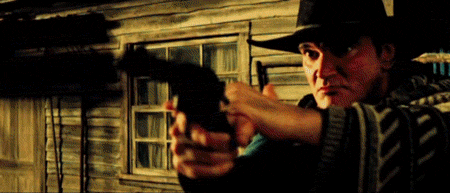
I’m already running out of things to say about this film… It honestly just seems like a drunk or high idea by both Tarantino and Miike. The choice to make the film in English almost made it more absurd. It definitely fits Tarantino’s genre, though I can say I am not as fond of this film as I am other films of his such as Pulp Fiction.
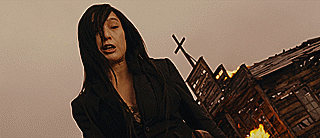
Ben Ten was a fun little twist, though I do think it odd that if she was this powerful, why didn’t she do anything to save her daughter-in-law as she was dying for 30 minutes. Overall, I felt this film handled women terribly. While Ben Ten is shown to be a “cool heroine,” it only seems to appear that way so that Tarantino can get a few more scenes and so that everyone can end up dead. I felt like all the women shown in the film came from some old man’s sexist pipedream. It was weird and honestly kind of demeaning - definitely a film that makes me hate depictions of women written by men in media even more.
One thing that I like to use to decide whether something is putting female character’s in is the “Hawkeye Initiative,” that came to use in comics for showing when art of female characters were overly sexualized. Essentially, artists replace the female character with Hawkeye and see the pose, clothes, and connotations of the final image are being used to over sexualize women. Here’s an example with Mary Jane:

In regards to Sukiyaki Western Django, I’d like everyone to imagine all of the character’s genders as swapped. Now reconsider all the scenes of violence and rape against the women in the film and all the ways that the portrayal of the female characters as passive beings going along with such violence ultimately hurts women. I think if all these scenes were done to men that the audience would react even more grossed out, which is a shame that these gendered differences still exist in film media portrayals. However, I was quite happy that it seemed those who watched the film in class with everyone also found these scenes terrible and audibly reacted as such, which gives me hope that these issues will be solved in the future.

But seriously Dr. Smith, why did you pick this film? I need to know
5 notes
·
View notes
Text
Sukiyaki Western Django - Miike
For this blog post I will be discussing Sukiyaki Western Django by Miike. Well, as one of my friends put it, this movie was certainly one of the movies of all time. One of the characters in this movie said it best, “Shit just happens”. A lot of this movie felt like “shit just happens” the movie lol.
The movie was so over the top and silly. It felt like I was watching someone play one of the Yakuza (龍が如く) games because of how ridiculous the fight scenes were. I remember when Yoshitsune was trying to retrieve the machine gun from Kiyomori, he literally was sniping him with a revolver. Considering the accuracy of a handgun, especially a revolver of that type, it’s unbelievably impressive. On top of all of that Kiyomori gets hit like 3 times and is completely fine, unlike all the other characters who die after one hit. Then there was the fight between the gunman (who from what I know has no official name) and Yoshitsune. The gunman duel wielding fires at Yoshitsune who deflects all of the bullets with his KATANA. Then the gunman parries Yoshitsune’s katana with his REVOLVER and pulls out a THIRD gun. These two scenes do a good job of showing how ridiculous the fight scenes were and why they were so much fun to watch. I was always on the edge of my seat waiting to see what thing would happen next.
I also never expected to see otaku Quentin Tarantino. I was wondering why at the beginning of the movie there was just some random white guy in the movie when everyone was Japanese until I remembered someone mentioning that Tarantino was in the movie. When Tarantino said that he liked the name Akira because he was an anime otaku I couldn’t help but laugh a little because it was so random. Since this was a fictional universe, I didn’t think they were going to make a reference to stuff in the real world, plus Tarantino being an otaku is funny to me. The scene were Tarantino yells at Ruriko for making bad Sukiyaki and tearing her dish apart was hilarious to me. It was just so bizarre to see the white and western Tarantino go off at a Japanese lady for her subpar Sukiyaki while actually having a high level of knowledge on the dish.
Another scene that made me laugh was when Kiyomori was reading literature to the Heike clan. Kiyomori comes to the conclusion that because the red roses win in Shakespeare’s Henry the 6th, they would win against the Genji clan, and he changes his name to Henry. It was just the silliest logic, but somehow worked in the context of the movie. Watching the sheriff play dead to avoid dying was also humorous since he survives so many times lol.
I felt like the movie’s greatest strength was it’s visuals. I really enjoyed seeing the fusion between the traditional samurai aesthetic with the stereotypical cowboy western setting. It felt like a weird alternate universe where Japan settled America instead of Europe. It gave me Shin Megami Tensei IV vibes, as they did a similar thing by blending a Medieval European setting with Japanese Samurai. You can really see this in the beautiful set design, backgrounds, and costumes.
Overall, I liked this movie, but I would not say that it is one of the best movies we’ve watched in this class. It was honestly hard to take this movie seriously, especially with how over the top it was. I also couldn’t help but notice how unnatural the English sounded in the movie, which was understandable considering that English was probably not the first language of the director or actors. However, odd phrasing and bad line delivery did take me out of the experience from time to time. Despite its flaws, Sukiyaki Western Django is a fun watch.
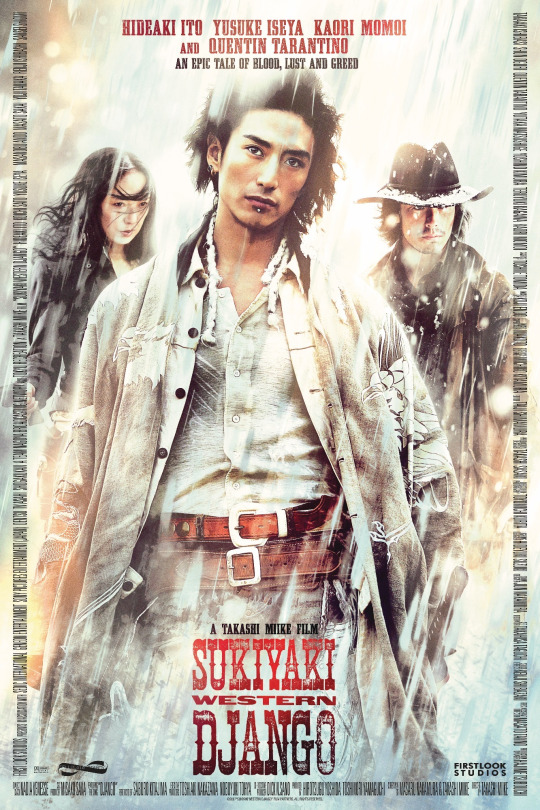
2 notes
·
View notes
Text
I also appreciated Tokue’s optimism and cheerfulness in spite of her disability. She really helped to inspire Sentaro and Wakana, who had suffered similar loneliness and isolation as Tokue did in the quarantined leper village. Tokue’s dedication to making the bean paste properly really shows her passion for cooking and shows her warm loving personality. I agree that this movie left me with a warm fuzzy feeling and was very wholesome. Like you mention in your post I agree that the simplicity of the movie’s story was one of its strengths. It really allowed them to focus in on Tokue’s struggle and how she affects the characters around her.
Sweet Bean - Kawase
Everyone cooks in their own unique manner, and how you go about preparing a meal says a lot about your personality. Anyone can cook and this universality is what makes it such a fascinating act. It can bond or differentiate anyone and it is so integral to our humanity that it is truly an extension of the soul. It involves handling and transforming natural aspects of our world into creations of our imagination. It is the true embodiment of art. A transformation of the natural to the man-made for others’ enjoyment. Sweet Bean understands the impact cooking can have on someone by showing its ability to inspire love in someone.
Tokue is an elderly lady that has a sacred love and understanding for making bean paste yet must grapple with a condition that slowly cripples their physical faculties. It is a cruel twist of fate, yet she never once complains about her situation. She is full of wonder and the opportunity to continue to make bean paste is all she needs to feel satisfied. The dedication she has for her beans speaks to the impact love has on creation. Her bean paste is miles better than the store-bought ones Sentaro previously used because there is true love in her concoction. Her love is magnetic and the often closed-off Sentaro finds himself attracted to the pureness that is Tokue’s mind. She can not believe he would buy bean paste in bulk because it is an insult to the craft she has dedicated her life to and it is the exact cheapness and greed of modern society that she is appalled by. Tokue is infatuated with life itself and teaches Sentaro to find appreciation for the wholesomeness life has to offer. On several occasions, she expresses her love for the trees and the youthful whimsy of children. Sentaro, who expresses the kids as being noisy and has disdain for sweets, becomes infatuated with Tokue’s perspective on life. She invokes a love for life that was dormant within him and it is cooking the bean paste together that teaches him what true care for something can cultivate.
This is now my favorite film we’ve seen in class and the best thing I have seen in a while. Sweet Bean reminds you just how beautiful life can be and how easy it is to take for granted. It leaves you with that warm fuzzy feeling on your brain that manages to only grow after watching. It has so much beauty it can be blinding and it is easy to get lost in its overwhelming emotions. But maybe that is the point. Life is overwhelming and it can be easy to get lost in its sheer infiniteness, but that’s what makes it so spectacular. This movie goes exactly where you expect as it lacks any one aspect that serves to blow viewers away but its simplicity speaks volumes.
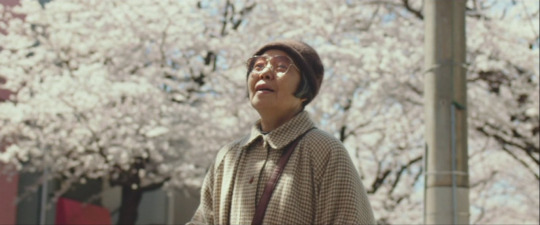
2 notes
·
View notes
Text
Sweet Bean - Naomi Kawase
For this blog post I will be discussing Sweet Bean by Naomi Kawase. This movie centers on a small Dorayaki shop, its manager (Sentaro), an old lady (Tokue), and a schoolgirl (Wakana). It starts out with Sentaro just making Dorayaki as normal, but then Tokue shows up, and after showing her superior bean paste gets a job at the stand. She teaches Sentaro how to make the paste and things were going well until rumors of Tokue’s previous illness, leprosy (which had left her disfigured), starts spreading. This negatively affects the building leading to Tokue quitting. Wakana runs away from home with her bird and goes with Sentaro to check on Tokue, they visit and learn about her past as a leper in the quarantined area of the city. They learn the secret of adding salt to the bean paste to improve the flavor, but when they come back the person to whom Sentaro owns a debt remodels the place and forces him to hire her nephew. Then Tokue dies of pneumonia, which gives Sentaro the resolve to open up his own Doryaki stand (and thus embraces a newfound freedom).
As for the themes of the movie, the most obvious one would be discrimination. The main aspect it shows discrimination is in the poor treatment of those who suffered from leprosy. Despite leprosy not being a highly contagious nor incurable disease, the people who suffer from it were still treated as if it were the case. As seen in the movie they were relegated to isolated parts of town with the rest of the lepers, cut off from their families and the city. Through this oppression they lost a lot of freedom and many opportunities due to a false notion about their condition. Not only that, but they also continued to suffer from the negative social stigma of the disease even after they no longer were infected as they were permanently disfigured from it.
There is also some discrimination based on age at the beginning of the movie when Sentaro is considering whether or not to hire Tokue. Despite the job saying that there was no age limit for it, Sentaro still didn’t believe that Tokue could do a good job because of her age and did not hire her initially.
Personally I thought that it was a really good movie and was a fun watch. Not really sure why Wakana was a main character to be honest. I think she was supposed to represent poverty (since she is always going to the shop to get the rejected dorayaki and isn’t going to highschool or cram school) in modern Japan, but they don’t really expand on it all that much since the focus is on Tokue. I wish they delved more into that topic, as it felt like somewhat wasted potential on that front. I really enjoyed watching them make dorayaki during the film, since it looked so delicious. It reminded me of when I had fresh dorayaki in Asakusa Tokyo.
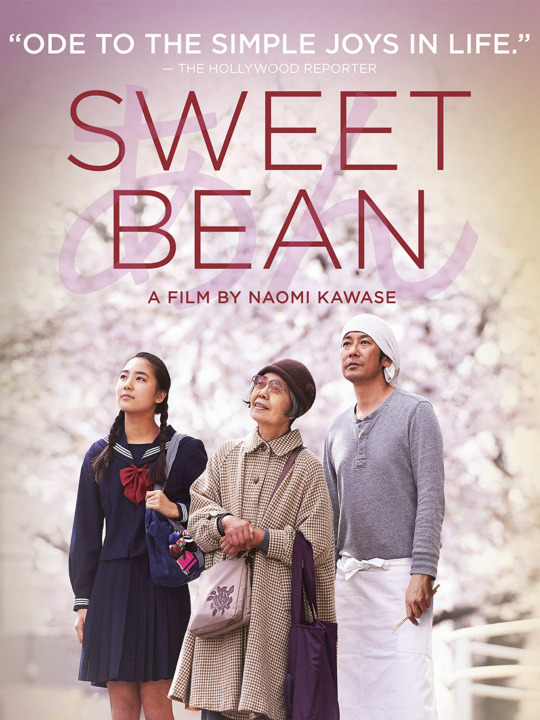
0 notes
Text
I also felt that the shift between the two narratives and change to an apocalyptic setting at the very end was a bit jarring. I also was a bit annoyed when characters would split up, even though it was an obvious bad decision. I believe the message of the film was to show how technology can isolate people, hence the ghost that make people lonely and apathetic come from technology. I think the ghosts essentially represent the effect technology has on society as a whole.
Pulse - 回路
As far as Japanese horror goes, this is not near the top of my list sadly. While I did appreciate some of the on-screen visuals and the atmosphere on display, the constant bouncing between two distinct plotlines and a rather muddled message that ended with a pretty jarring shift to an apocalyptic setting really bogged down any positive elements I saw here.
It seems like this movie came in around the height of the J-horror boom after Ring really caught the international attention, and this film set out to deliver further on ghost stories that avoided gore and violence over tension and atmosphere. Plenty of points were definitely unsettling, but overall, I feel like the plot fell victim to “this is only happening because every character has a lower IQ than average.” It’s an interesting enough premise, once I pieced together what it actually is, which is that the world of the dead is becoming overrun, and spirits are invading the world of the living, or so one of the characters claims. The devices that are used to help keep us connected are vulnerable to these invaders, and so the living become subject to their intense apathy and give up on life the same as these ghosts did. Rather than inflicting pain, they simply invite the living into their own isolation. “Death is unending loneliness, why should I be the only one to suffer it?” is a possible motivation here, although it is never explicitly stated beyond a confrontation with a spirit towards the films end.

My issue with all this is I’m still not sure what message this is sending out exactly, I don’t think it’s meant to be pure entertainment or just shlocky, I’m sure there’s some kind of commentary on human isolation, connections, budding technology and how this affects people socially. My best guess is that this is trying to confront the issues of “hikikomori” culture, especially as it was developing at the turn of the millennia, in that many people in Japan were beginning to live in total isolation, almost withdrawing entirely from society. "People don't really connect, you know. We're all totally separate." Many of the deaths in the movie are suicide victims who were living alone, forced into isolation by their work routines or other life circumstances. It’s a real and prevalent issue in Japan to this day, with many people passing away alone and going unnoticed for extended periods of time. Maybe this film is an attempt at painting an image of what can happen to the world should too many people give up on staying connected while living their lives in a more fulfilling manner, and instead resign themselves to being isolated and passing on alone. I still think that the ending sequences feel too obtuse compared to the way the film was set up, and that a less dramatic and more somber ending would have been more appropriate.
I really can’t say this movie was really outstanding for me beyond a few cool visual sequences and some interesting attempts at commentary on human isolations and connections, but these ultimately fell flat in the end given the rather jarring transition into the unveiling of an apocalypse. This one really fizzled out for me.
6 notes
·
View notes
Text
Pulse - Kurosawa
For this discussion post I will be discussing Pulse by Kurosawa. I had heard that this movie was scarier than Ringu, but honestly did not scare me that much. I will admit that the glitchy computer ghost were a bit freaky, but not much beyond that. I was waiting for the biggest scare like the stare in Ringu, but it kind of just doesn’t happen in this movie. What you really feel is the haunting presence of the ghost throughout the movie. This feeling of dread caused by the constant presence of the ghosts really added to the atmosphere. It honestly felt like no matter where you went you were always within there sphere of influence. That was one thing I think Kurosawa did better in this film than was done in the Ring. Sadako didn’t seem when you weren’t near a television, but the ghosts in Pulse felt like they were literally everywhere. This feeling of dread is part of Kurosawa’s style, which is enhanced by his framing techniques through the movement of characters and the presence of things not in frame.
The ghosts in combination with the haunting city, as it got emptier and emptier just made the film feel eerier and eerier. The way people faded into nothingness was honestly pretty chilling. The ghosts said that if one was alone and isolated, they were already dead (spiritually), which lead to the characters giving up their will to live and turning into the shadows. The way the city felt so empty honestly reminded me a lot of Shin Megami Tensei, specifically Nocturne. I don’t know if it’s version of Tokyo, after the conception, was inspired by Pulse (considering it was released 2 years later) everyone turns into ghosts, and it feels just as eerie and empty as Pulse’s world at the end.
The main message of pulse was to show how technology effects society as a whole. Kurosawa tries to show a negative aspect of technology, by showing how it literally isolates people. It is through technology that the ghosts are able to enter the human living world and infect people with loneliness. It isolates people to the point that it feels like they no longer exists, thus turning into the shadow.
I initially did not think much about the films message when seeing it the first time, but when looking back on it I feel like I can really resonate with the film’s message. Despite the world being more connected than ever before through social media, it often feels like we are even more isolated than before. I often feel like we can get trapped in the digital world to the point where we are isolated from the real world.
Also I was not sure if the red tape on the door was supposed to be an allusion to the blood painted on the door frame from Passover, as that was what it reminded me of.
I did think the movie went on a bit too long at the end, but I did enjoy the movie overall. I really enjoyed the special effects for the ghosts, as it made them very spooky.
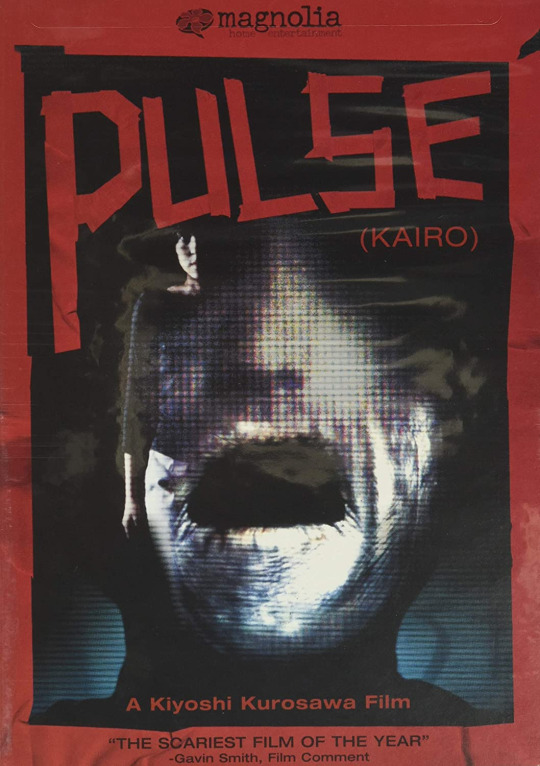
2 notes
·
View notes
Text
I also found the American version to be scarier for the most part. The special effects really helped to make Samara feel a lot scarier than Sadako. I did think Sadako’s stare was scarier than Samara’s. Samara’s stare just made me laugh since it looked goofy to me. I also noticed the report about Anna Morgan in Japanese which I thought was a nice nod to the Japanese origin of the original film. There was also a Japanese piece of art on the wall of Mr. Morgan’s house, but it was shown when Rachel snuck back into the house at night so it was easy to miss.
Gore Verbinski: The Ring (2002)

To begin with, I think the 2002 American remake of Ring was much better in the sense of what is traditionally expected from a horror film. The special effects were great, and the real-life appearance of all the creatures and objects that were shown in the “cursed tape” cemented the film’s cyclical nature (which I talked about in my original post). Additionally, the father-son interactions between Noah and Aiden that were lacking from the original 1998 film made the ending all the more tragic and horrific. I would also like to add that I absolutely loved seeing the equal relationship between Rachel and Noah. Unlike Reiko in the 1998 film, Rachel took initiative of solving the tape’s mystery throughout the film’s duration without an over-protective male lead. After watching the 1998 film, it was refreshing to see a healthy marital relationship where the two respect each other and work together but independently on solving the tape’s mystery.
However, I do have some gripes with this remake. One aspect that I liked about the original 1998 film was its theme of overturning the patriarchy (which I covered in my previous post). While, I have no problem with this theme not being present, I do have a problem with the Freudian take on horror films that is displayed in this 2002 version. It was perplexing to see Freud’s psychoanalysis blatantly depicted in the way that Aiden often calls his mother by her first name and seemingly withholds information about how to “dispel” the tape’s curse which results in the death of his own father. I also didn’t like the aspect where Anna kills her daughter Samara, because she poses a threat to her relationship between her and her husband. Thematically, I think the original 1998 Ring fared better than the 2002 remake.
Overall, the 2002 remake did a great job in incorporating aspects of the 1998 film*, but still making it original. The 2002 version was without doubt much scarier and performed better as a horror film. That being said, if I had to choose between the 1998 and 2002 Ring, I would choose the 1998 one for its plot. I guess the preference between these two films ends up being if one likes horror films more for its horrific elements, or for its storyline. I choose the latter.
* I enjoyed the nod to the Japanese origination of Ring when Noah is rifling through Anna Morgan’s file and enclosed in it is a paper that is filled with what looks like kanji that otherwise has no reason to be there.
@prof-csmith
1 note
·
View note
Text
The Ring VS Ringu
For this discussion post I will be comparing the Ringu to the American adaptation of the movie The Ring. Overall the films are very similar, almost all the plot points are the same. The biggest difference between the two movies are the backstory of Sadako and Samara being different.
Sadako had psychic powers in Ringu, she was killed by her father Ikuma, her mother also had psychic powers, and her father was a doctor.
I had expected that they would change the ghost’s background to fit the new setting, America, for The Ring, so that much was not surprising. In The Ring, Samara (the ghost) is not even the biological daughter of the Morgan’s (who I believe were horse ranchers), but was adopted. She has psychic powers similar to Sadako, but there were some other things that differentiated her. The thing that was probably most different was the extent of Samara’s power in comparison to Sadako. Sadako was able to attack Reiko far away from a TV once when they were on the beach, but Samara’s influence seemed to be much stronger. She influenced anyone who was cursed to draw certain pictures or scribble rings, she could make water come out of the tv and phone, she was able to somehow place hair in Rachel (the reporter’s) throat, she was able to use telekinesis to move the tv to attack Rachel and move the cover back over the well to trap Rachel in it, as well as being able to burn people. She also was able to drive people crazy such as her mom (as well as the horses who committed suicide).This version of the ghost seemed a lot more threatening than Sadako, although I think that appearance wise Sadako was scarier. When I saw the reveal of the ghost’s face I chuckled a bit since I thought it just looked a bit goofy. One other thing that was different was that in The Ring it was her adoptive mother that killed her, not her father.
They do replicate a lot of the powerful scenes from Ringu very well such as the scene where the reporter’s son watches the tape and they are horrified and try to cover their son’s eyes, the scene where they hold the corpse in the well, as well as the scene where they find the well under the house. It pays a really good homage to the original movie, especially with the cinematography.
In The Ring the TVs are a lot more menacing than in Ringu. In Ringu there often would be a TV looming in the background, but in The Ring a TV literally attacks Rachel. Not only that, the TVs constantly turn on by themselves (which I don’t remember happening in the original), which was pretty creepy. The most impactful scene with the TVs is the scene where they show all the TVs through the apartment windows in Rachel’s apartment complex, as it shows how Rachel is quite literally surrounded by Samara’s influence and it makes it feel like she can’t escape her.
To be honest it was hard to be scared during this movie since I knew what was going to happen based on the first movie. Since I knew copying and showing the tape to someone else would save her, I knew that Rachel was not in any real danger in the second half of the movie, so it took a lot of the tension out of the movie. I also wasn’t really scared by the first movie, but I will admit that I think this movie was a bit scarier, especially when comparing the victims faces in Ringu vs The Ring.
I did notice that when Noah looks through Anna Morgan’s file, there was something written about her in Japanese as well as their being Japanese art in Mr. Morgan’s house. I thought that was a cool nod to the Japanese origin of the original story and movie.
I liked that they addressed the dilemma of removing the curse in this movie, since in order to do so you must curse someone else. I honestly was surprised that they didn’t talk about it in Ringu, they kind of just ignore it.
Overall I thought The Ring was a decent adaptation of Ringu, as it was pretty faithful to the original movie. It was definitely better than the American adaptation of Godzilla where they inserted a random character into the movie that wasn’t originally in the movie. It was definitely a fun watch; I would recommend it if you are curious as to how the two movies stack up to each other.
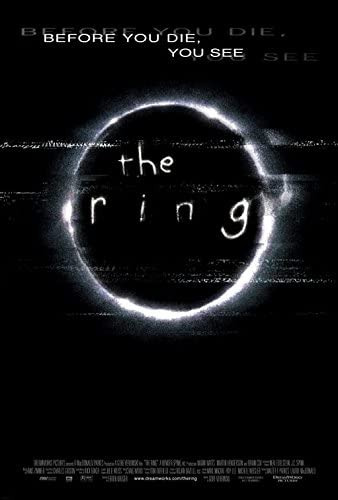
1 note
·
View note
Text
I also thought the movie was not that scary. I was waiting the whole movie for it to get scary, and then it happened for like 5 minutes at the end, but that was it. The movie also reminded me of chain emails, like if you don’t forward this email to 5 friends you will have a year of bad luck. Like you mention, most people don’t seem to know where the rumor of the tape came from so it is similar to a meme or creepypasta in that aspect.
Ring - (JPT3391)

The Ring is a Japanese horror movie that was substantially less scary than I remember it being the first time around.
In the movie we follow the curious story of a cursed video, where anyone who watches it receives a phone call, and then dies one week later. Everyone outside the incident treats it with a mix ranging from idle amusement to outright disregard. The same applies to the protagonist here, until her niece dies and all evidence points to this mysterious video
For my increasingly less historical historical context, I’m gonna talk about media because the movie makes me think of that, mostly in the nature of the curse itself. At the beginning of the movie, nobody is entirely sure where the tape and the story of the curse started in, with everyone asked saying “I heard about it from someone else” or “didn’t that start in Izu?” I think this lack of collective responsibility here is really interested and ties in a lot to the way information spreads on the internet. I could liken it to a meme where it feels like nobody comes up with memes most of the time, they just kinda show up and get passed around. However, I think the more relevant example here based on the 1998 release date would be chain emails. I feel like every one in this class has at least once gotten an email or chat message saying “if you don’t share this to 5 people within one week she will appear in your closet” or other such nonsense. Similarly to the video in the ring, there’s no source determined here, we never 100% know where the video comes from, as the movie makes us doubt the spiritual explanation.
Additionally, I think there is significance in the way to rid oneself of the curse. Over the movie, Tomoko is the only one who successfully rids herself of the curse. However, doing so is not a result of any of the efforts she makes with her husband, traveling to a remote island, staying up late in the library, late nights sifting the video itself. None of it matters. The only action that does matter is perhaps the most negligent one, where Tomoko copies the tape to show to her ex-husband. Although it must also be said that we’re never 100% sure that was the case, as the characters are never able to understand and rationalize the supernatural. Their attempts to comfort Sadako also don’t have any apparent effect. The unfortunate circumstances of the tape and it’s curse happened and there’s nothing you can do about it except to pass it on – shift the problem to someone else. I think this avoidance is kinda feeding into a postmodernist idea of lack of meaning or reason. Sometimes things just happen.
2 notes
·
View notes
Text
Ringu - Hideo Nakata
For this discussion post I will be discussing Ringu directed by Hideo Nakata. It was based off a series of books written by Koji Suzuki and revolves around the mystery of a cursed video tape that would kill you a week after you watch it.
I was somewhat familiar with the ghost from Ringu, Sadako, and was pretty much just waiting for the ghost to crawl out of the TV the entire movie. I was confused as to how Sadako’s powers worked, so I decided to research it a bit. This made it more confusing as apparently Sadako’s powers differ between the book and the movies. In the books she has the ability to change DNA and viruses and killed people with a tumor after a week through some kind of mutated smallpox, which sounds absolutely ridiculous. In the movies she can just kill people with her mind or crawl out of the TV and kill them. I think her powers in the books are more interesting just because of how crazy it sounds, so I might read the books when I have some free time.
The interactions between all the characters in the movie feel really uncomfortable. There is this building dread throughout the movie, since you are just waiting for something bad to happen. This in combination with all the shots of people just staring off into space, the creepy cuts to the ghost visions, the quietness, the dull colors, and the constant reminder of time running out makes the movie feel surreal and unsettling. It almost felt like I was watching someone else’s nightmare.
Knowing how to escape the curse makes deciding to escape the curse a difficult decision. Since in order to escape the curse you need to show someone else the tape and make a copy of it, you need to curse someone else to lift the curse on yourself. Not only does it curse someone else, but it increases the number of cursed tapes in circulation, thus making it easier for the curse to spread. Someone could limit the spread of the curse if they decided not to show the tape to someone else and destroyed the tape they had, but they would end up dying.
I honestly thought the movie was going to be a lot scarier than it ended up being. There were some jump scares that made me flinch a bit, but nothing that really scared me too much. The atmosphere of fear created by the mystery of the curse was scarier than when Sadako finally climbed out of the TV and killed Ryuji to me.
Another thing that bothered me with the movie was I didn’t understand why Reiko decided to watch the tape in the first place. I get why Ryuji and her son watched the tape, Reiko made Ryuji watch it and her son was under the influence of Tomoko’s ghost, but no one made Reiko watch the tape. I know she was investigating the deaths behind the tape, but I thought she would’ve been a bit more hesitant to watch an unnamed tape after hearing that people died from watching a cursed video. After hearing a rumor like that the last thing I would do is watch an unnamed tape, or watch TV in general (as I believe she can appear on TV late at night). Not only does Reiko watch the tape, but she also brings it home and leaves it in a place where her son can easily watch it. I instantly knew the son would be cursed because she brought the tape home. It seemed like this was something Reiko easily could have avoided. Perhaps I shouldn’t be applying logic to a horror movie seriously, as characters in horror movies are often notorious for making bad decisions.
Overall, I enjoyed the movie, definitely held my attention, especially in the later half. I’m curious about the lore of Ring, and may read the books in the future. I was expecting it to be much scarier, but I guess I’m okay with it not being that scary since at least I won’t get nightmares from it.
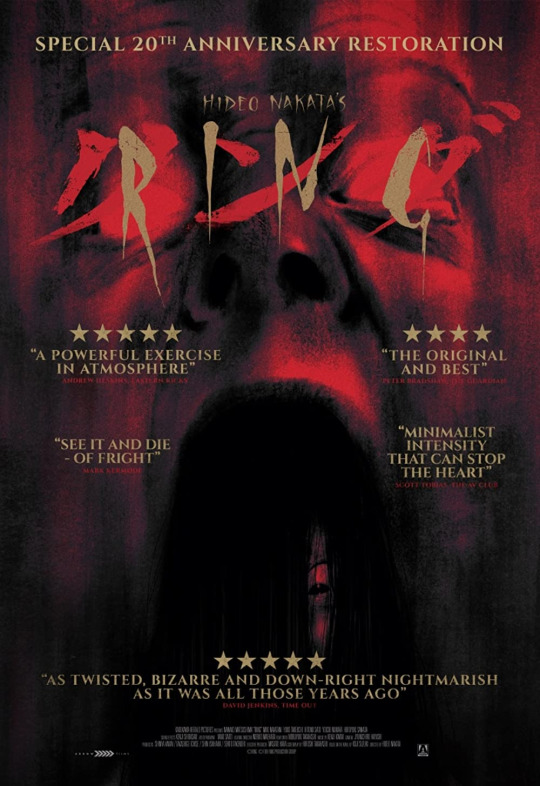
3 notes
·
View notes
Text
I also enjoyed this film for its sense of humor and over the top action scenes. I don’t know how I missed the theme of money when writing my post about the movie, as it is the most constant presence in the movie. A lot of the characters motivations as well as their problems all tie back to the need for money. As you mention one of the main messages of the film was that money doesn’t bring you happiness, as exemplified in the ending scene where they burned all the money Ageha had collected to buy the club back. I also enjoyed the dystopian “high tech, low life” setting, almost gave me the same vibes as Midgar from Final Fantasy VII.
Iwai – Swallowtail Butterfly
I found Swallowtail Butterfly to be one of the best films we’ve watched so far in class. I had moderately high expectations after reading a brief overview before watching it, and my expectations were definitely surpassed. Categorized as a crime drama, I was surprised to find out that many of its scenes were particularly comical. Also, the way this film mixes Chinese, Japanese, and English was really interesting.
The film follows an array of characters but primarily focuses on a teenage girl named Ageha. It begins with the death of Ageha’s mother in Yen Town, a dystopian city based in Tokyo. We also learn in the beginning, that a majority of Yen Town’s population is comprised of undocumented immigrants that do illegal work and for that reason it’s not uncommon to be considered nameless. Without having anywhere to stay, Ageha is passed around to a few different people before Glico, a Chinese prostitute living in Yen Town, decides to take her in. Soon after, Glico’s friends who work at a junkyard/repair shop, are introduced. Due to some circumstances, one of Glico’s clients gets killed while with her and the friend group helps to hide the body. Inside the body, they discover a tape which contains data used to create counterfeit bills, linked to a prominent gang leader. They create a scheme to make money quickly and open a live music venue, which eventually causes them quite a few problems. Left to her own devices, Ageha runs into trouble but learns from her mistakes; her maturity symbolized when she decides to get a butterfly tattoo on her chest similar to Glico’s.

I really enjoyed the maximalist set designs of Yen Town showcased all throughout the film. From Glico’s room to the Yen Town underground market, each was executed with keen attention to detail. Set in a dystopia, there are also some designs evidencing “high tech, low life” such as the characters’ use of computers and technology despite being in the slums.
Overall, despite its long runtime, I thought Swallowtail Butterfly was thoroughly engaging and enjoyable. I liked its message about how money doesn’t bring happiness as at the end the main group of characters burned the rest of the money Ageha had collected. Despite the hardships they went through, most of the characters were able to find a sort of bittersweet happiness by the conclusion of the film.
1 note
·
View note
Text
Swallowtail Butterfly - Shunji Iwai
For This discussion post I will be discussing Swallowtail Butterfly by Shunji Iwai. The movie is about a group of immigrants living in the immigrant slums of Tokyo. Tokyo was called Yen Town as it was seen as a place to make money at that time, but also became the name that people called the immigrants who came there in search of money (which was summed up perfectly by the movies iconic introduction). Through there struggles they open a club (which was semi-successful until it was forced to close), they make money using Ryo Ranki’s tape and scamming the atm’s, and eventually have to deal with the Chinese mafia, law enforcement, and the dangers of the slum itself.
I think the introduction setting the premise for the entire movie was a smart choice on Iwai’s part, as it helps the viewer get a feel for what to expect in the movie. The way Ageha narrates it with the text flying across the screen also makes it very memorable and is a really strong first impression for the movie.
As for the themes of the movie, it definitely feels like it delves into racism and family. Racism seems like the most obvious theme of the movie, as the main characters of the movie are mostly Chinese immigrants, and as a result face a lot of racism at the hands of the Japanese people around them. Some good examples of this would be how the music agent got Fei Hong’s club closed down and got him arrested, how it was not possible for Chinese immigrants to actually own and manage the club in their name (and they had to get a Japanese person just so they could own the property), and the brutal treatment they got from law enforcement (especially Fei Hong, who I believe was killed by the interrogators/prison guards).
The other main theme I saw was that of family. This can be seen particularly in the strong bonds she forms between Glico and Fei Hong, who act as her older sister and brother. Ageha starts off with no connections and alone, to the point where she didn’t even had her own name. This shows how isolated she was at the beginning of the movie. It is through her interactions between Glico that she is able to get a name and is introduced to the other immigrants such as Fei Hong at the car repair shop and she is able to find a place among this new family. She is also able to connect with Fei Hong by learning Chinese.
The movie is also pretty violent, as would be expected with a crime drama. It honestly felt a bit like a Grand Theft Auto game at some points by just how ridiculous the action and fight scenes were. For example, the fight between the guy with the shot gun at the auto repair shop and the Chinese mafia guy with make-up where the shotgun guy just blows up the entire army of mafia guys and their trucks. It was an explosion that would’ve made Michael Bay proud. On top of that someone walks out of the shop behind him with a LITERAL ROCKET LAUNCHER. How did they even get their hands on a rocket launcher?!? It was fun to watch, but I couldn’t help but feel it was a bit over the top at times.
Overall, I enjoyed the movie and thought it was an entertaining crime drama. There were a lot of characters that I enjoyed such as Fei Hong and Ageha and I felt invested in their struggle. I did feel that the movie dragged on a bit and was hectic at times, but I would not say that it greatly affected my enjoyment of the movie.

4 notes
·
View notes
Text
I also found it funny that the junkyard guy was just totally fine with Nishi robbing the bank. The idea of Nishi embracing short term gains while sacrificing a long term future in the context of a post bubble era 90’s Japan is an interesting analysis. Nishi really does seem to capture that sense of hopelessness like those in the face of the crashing Japanese economy. I agree that Horibe is a foil to Nishi, as I saw someone else mention in their blog post that Horibe addresses his grief and problems internally through art and that Nishi takes his anger out on the world around him through use of violence. Horibe also does decide to to continue on living as you say, and Nishi gives up the long term since he no longer sees value in it. Good analysis of the film!
Hana-bi - (JPT3391)
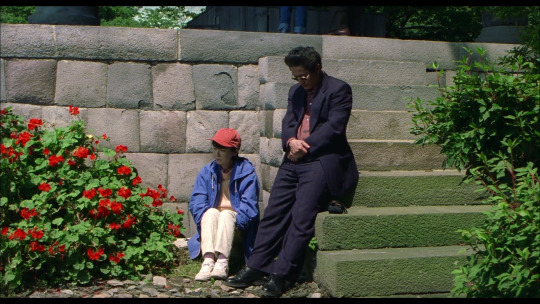
Hooo boy this is a lot to unpack. While I don’t have the strongest idea, to me Hana-bi feels like a movie about trying to outrun fate.
This movie had a somewhat forgettable beginning for me that escalated into a wonderful memorable middle and ending with some ambiguity to it. I was also surprised about what this movie reminded me of through watching, as I never came up with a thematic match for it, the closest I got was Skyfalland and The Shawshank Redemption. The latter in particular felt similar to me because I feel like both movies had a “I had to learn to be a crook to get my peace” aspect to them. This movie was also funny, I enjoyed the early scenes at the junkyard; Nishi-san outright says he’s going to rob a bank and the junk dealer laughs and wishes him good luck, only to be amazed when he actually does it. I think this takes away from the seriousness of the movie a bit, but in a way that’s more effective in allowing the movie to remain enjoyable as Nishi-san is apparently worth rooting for in universe, making the audience accept that as well.
Historically, I think this movie has thematic parallels to the Japanese economic bubble bursting in the early 1990. While I think it’s a bit of a stretch, hear me out.Nishi-san, after encountering intense misfortune in the death of his daughter and terminal Leukemia of his wife, which is already enough to bring most sane people to the brink, is also faced with his longtime partner and good friend Horibe-san getting paralyzed after Nishi-san leaves a shift to see his wife. This compels Nishi-santo work exclusively in the short term in order to give his wife a bucket-list style sendoff. He accomplishes this but at the cost of any long-term future he might’ve had. This strikes me a similar to the bubble bursting, as the bubble was fueled by risky and unsustainable practices that, upon their failure, created a depression that stuck with Japan for over a decade and would certainly still be strongly felt in 1997, the year of the movie’s release. In this paradigm, Nishi-san’s actions are those of one going the full 9 yards into excess knowing full well that they will have to take the fall at the end. I think this presents an interesting reaction to recession, where most people would regret it because of the long term consequences. Meanwhile, Nishi is embracing the short term gains, having given up the idea of having a long term to spend his last days with his wife. While I think this connection exists to a point, I wouldn’t go so far as to say the movie is a commentary on the bursting of the bubble economy.
I think this framework tells a lot about Nishi-san as a character. The beginning of the movie makes an effective effort to portray him as smart and capable in his work, and I have no doubt that he would be aware of how leaving his job and his murderous commitment to spend the last of his days with his wife uninterrupted. Iin this respect, I think of Nishi-san as a foil to Horibe-san, who lost his family and his mobility but has no restrictions on his ability to continue living. Nishi, seeing what this did combined with his own value judgments about his relationships, decides that a long term in that vein is not worth living. This in my opinion is what motivates him borrowing money from the Yakuza, and robbing a bank as well as several counts of murder or gruesome personal injury; it’s a calculated judgment to spend the best quality time with his wife that he can manage.
Overall this movie is an interesting case for me, Nishi-san feels kinda like a kinder James bond with a different motivation, while James Bond seems more tied to whatever mission MI6 sends him on this time, Nishi-san uses his skills because of his worldly attachments and to protect them as best he can.
1 note
·
View note
Text
Hanabi - Takeshi Kitano
For this discussion post I will be discussing the movie Hanabi (Fireworks) by Takeshi Kitano. Hanabi was an interesting movie that revolved around ex-police officer Nishi, as he struggles to accept the fact that his wife is dying, the trauma of his comrades dying, and his misadventures in the criminal underworld.
The first thing I noticed in the movie was the fact that Nishi was almost always wearing sunglasses. He would even be wearing them inside sometimes, which is just really weird. My guess is that they had some kind of symbolic meaning, perhaps when he is wearing his sunglasses he is putting on a persona or is hiding his true self.
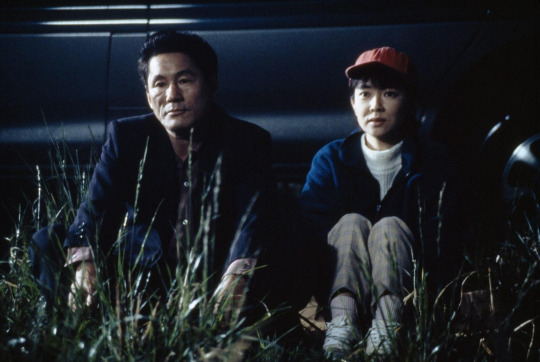
You can always feel this kind of weird dissonance when watching the relationship between Nishi and his wife. The fact that he planned this trip and spent a bunch of time doing things with her shows that he cares for and loves his wife, but on the other hand you can clearly see the distance between Nishi and his wife. This culminates in the scene where it is implied that he shoots his wife and himself with the last two bullets in the revolver he got from the yakuza thug.
You can tell something bad was going to happen for two reasons, one was the suicide painting that the guy in the wheelchair drew, and the other was that he was wearing sunglasses while spending time for his wife for the first time. When looking back through the film I checked to see where he was wearing his sunglasses, and he never wears them with his wife until that day, so you knew something was up. This really built up the tension in a subtle way, and since the day goes on for so long it just prolongs this uneasy feeling.

You also get this feeling when he is talking to his old coworkers, as the interactions with them just feel really awkward. Things must have not been the same after the death of Tanaka, and it broke the social dynamic between Nishi and the crew. The dissonance may also be due to Nishi’s violent streak, where they mention being scared of him when he lost his temper and unloaded his gun into a dead body. In the past when he’s at the sushi restaurant with one of his coworkers, Nishi still has the glasses off, so he is still his true self at this point. You can tell by the fact that his interactions still seem genuine at this point.

Nishi also does not were sunglasses when he is preparing for and carrying out the bank robbery, and when he confronts the yakuza for the final time. I think this is because the excitement and thrill of it helped him to feel alive and brought him out of his sadness and disillusionment. This and the time spent with his wife were the only times he felt like himself, so they show him without sunglasses.
The fact that no one comments on Nishi wearing sunglasses pretty much all the time leads me to believe they are symbolic, and that Nishi isn’t actually really wearing any literal sunglasses. They are just a way that Kitano communicates to the audience that Nishi isn’t his true self at that moment, and that he is putting on a persona.
I also really liked the scene where the guy comments on Nishi’s wife watering dead flowers since his quote, “It’s no use watering dead flowers”, pretty much sums up the problem Nishi found himself in with his wife. That’s probably why it made Nishi so mad, to the point that he beat the guy up for saying it.
There were also all the paintings done by the guy in the wheelchair, which some were obvious representations of what was going on in the movie, others were predictions of what would happen (such as with the suicide painting), and there were others where I was not sure what they meant. There were a lot of paintings of ‘flower animals’, I’m not sure if they were supposed to mean something? I’m not super familiar with flowers and what they represent, so this part kind of just went over my head.
As for my thoughts on the film, it was honestly very interesting. I was constantly on the edge of my seat, trying to figure out Nishi as a character, understand the symbolism, and anticipate what crazy thing would happen next. The soundtrack for this movie was great, and had this kind of jazzy feel to it. Nishi was also just pretty cool, the fact that he was able to take down the thugs with no effort was so awesome.

3 notes
·
View notes
Text
I also really liked the early 2000’s energy of this film, it had this sort of edge to it that is representative of that era. I also found Sugihara to be relatable, as he is just a regular student trying to make the best of the rough situation he finds himself in due to the society around him. Sugihara’s struggle to find his identity made for a very compelling and relatable narrative, as it is a challenge many people in college face to some degree as well. I also found Sakurai’s reaction to Sugihara’s Korean heritage to be heartbreaking, as it shows the racism against Korean people in Japanese society. The scene with the cop was a good contrast, and it was nice to see him treat Sugihara as just a normal guy.
Go
I didn’t know what to expect from Go. I knew going into it that it would be a coming-of-age story but not much else. This movie dripped with early 2000s energy. The constant references to popular culture and what was going on was very nice. It felt like a product of its time. Everyone loves a brooding young man with clear anger issues. From the beginning of the movie, Sugihara was very relatable and felt like a good protagonist. The movie did a good job painting a very clear message about Sugihara. He wasn’t a bad kid instead he was a product of the various generational traumas and racism that affected him. He wanted to fit in and tried his best at times. However, at one point he became very disillusioned with the whole idea of integration. He realized that he would never be able to find a place within society due to his heritage. This frustration led to Sugihara engaging in dangerous activities that included attacking cops and getting into many fights. The movie did a good job setting up the fact that Sugihara didn’t necessarily want to fight it’s just he felt like he needed to.
From the beginning of the movie, Sugihara states that this movie is his love story. This love story takes a while to start up. However, once it is in motion the movie does a good job building the relationship up. There was a little to be desired from the relationship. I wish there was more time dedicated to building that bond. I only have this criticism because the breakup felt bad but not like it hit hard enough. It hurt when she told Sugihara that they couldn’t be together because he was Korean. It felt like the one safe space that Sugihara had was destroyed. At no point in this movie is Sugihara in peace other than when he is with Sakurai. Seeing how he reacts when she expressed her racist sentiments was saddening. He is very quiet for most of it and then curtly answers her before leaving. You can tell that he is just disappointed and upset more than angry. We then get a scene where he chooses to knock out and then talk to a cop. This is the first time we see Sugihara feel comfortable talking about his feelings to someone. It was even more important because he was opening to a Japanese cop. This cop turned out to be more accepting than most of the people Sugihara had interacted with. It was a nice scene and did a good job showing the process that Sugihara was going through.
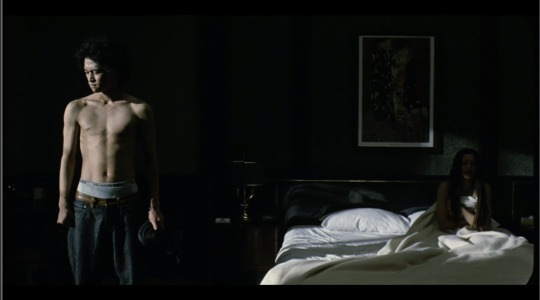
I think my favorite part of this movie was Sugihara’s relationship with his father. There was love there. However, there was a lot of anger and resentment. You can tell Sugihara blames his father and resents him due to the struggles he must go through. You can also tell that his father cares about him and wants to see him succeed. However, his father has no way of communicating this healthily. The relationship is so strained that when his father opens to him Sugihara’s only desire is to fight him. That is why when Sugihara states that he knows that his father only became South Korean for his future it felt gratifying. Being a child of two immigrants I understand the struggle and resentment that can be passed down due to that process. However, it is always important to remove that your parents took this dangerous step knowing the consequences. They knew that they wouldn’t be accepted and that they would face many hardships. But they also knew that this was the only way to give their child a real future. This part of the movie was conveyed beautifully and was capped off well.

3 notes
·
View notes